Exports play an important role in the UK economy, influencing the level of economic growth, employment and the balance of payments.
In the post-war period, lower transport costs, globalisation, economies of scale and reduced tariff barriers have all helped exports become a bigger share of national income.
In 2011, exports of goods and services accounted for 19% of GDP (up from 14% in 1990). Imports accounted for 24% of GDP – indicating that we have a current account deficit.
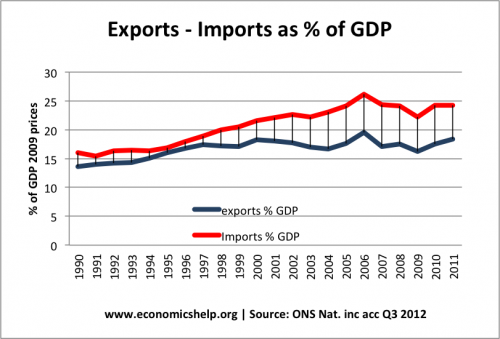
Importance of exports
- Employment. Growth in exports can create employment. For example, the growth in car exports has created many jobs in car industries, such as BMW factory in Oxford, and Nissan in Sunderland. Traditionally export jobs have been in manufacturing industries – an important source of full-time employment, especially in industrial regions. In recent years, exports have become more diversified with a greater reliance on service sector based exports, for example, computer programming.
- Economic growth. Exports are a component of aggregate demand (AD). Rising exports will help increase AD and cause higher economic growth. Growth in exports can also have a knock on effect to related ‘service industries.’ For example, the success of car exports in Sunderland will help the local economy with local clubs and shops benefiting from increased spending. Similarly, a fall in exports, during a global economic downturn can have a big negative impact on UK economy.
- Current account deficit. The strength of exports has a large role in determining the current account deficit. In the past few decades, the UK has had a persistent current account deficit, which many attribute to the UK’s relative poor export performance.
To reduce the current account deficit, the UK needs an improved export performance.
Exports to Europe account for approximately 55-60% of GDP. Though exports to non-EU countries are increasing at a faster rate than to EU countries.
What determines the level of exports?
- Competitiveness. The relative competitiveness of exports will play an important role in determining the level of exports. If UK prices relative to other countries, the UK will lose out. Competitiveness is determined by factors such as unit labour costs, inflation, productivity, infrastructure and price of raw materials (see: factors that determine competitiveness)
- Quality and value added of exports. For some industries like medicines, demand is price inelastic. Therefore, a change in price has less effect on demand. The key issue is the importance, quality and value added of the product.
- Exchange rate. A depreciation in the exchange rate will make UK exports more competitive, but may contribute to cost-push inflation and will cause more expensive imports.
- Long run productivity. (see: UK productivity)
- Economic growth in other countries. If the Eurozone enters a recession, this will adversely affect UK exports. With a Eurozone recession, even a depreciation in the currency may be insufficient.
How to increase the level of exports
- Pursue a weaker pound (in a fixed exchange rate – devaluation). A lower value of the pound makes exports cheaper, but this boost to competitiveness may prove temporary because of the increase in inflation. Also, if you rely on depreciation, exporters may have less incentive to cut costs and improve long-term productivity.
- Supply side policies to improve competitiveness. Supply side policies could include both interventionist supply side policies (such as education and training) and market oriented supply side policies (e.g. reducing the power of trades unions, reducing government regulation). This can enable increased productivity.
- Private sector innovation. There is only so much the government can do to promote private sector productivity. Competitiveness depends on new technology and management techniques as much as any government policies.
- Reduce tariff barriers. Lower tariff barriers can help increase trade. However, if you reduce general tariff barriers, some domestic industries may lose out because they can no longer compete. However, the theory of comparative advantage states overall economic welfare will increase – there will just be a shift within the economy.
- Reduce non-tariff barriers. Modern trade theories stress the importance of non-tariff barriers and obstacles to trade. Removing these can help make trade more frictionless and improve exports. Leaving the EU Single market may increase the friction of trade from new non-tariff barriers to trade.
Who does the UK export to?
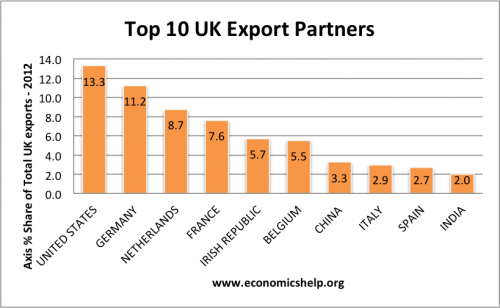
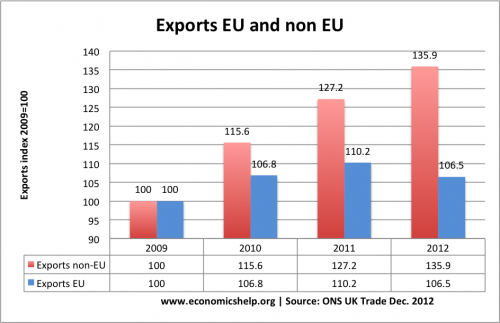
What does the UK export?
The UK exports a diverse range of products. Despite the process of de-industrialisation, we still manufacture many goods.
Some of the best performing export sectors in recent years include:
- Car industry. Although mostly foreign owned, the UK car industry is a major exporter. UK factories built 1.46 million cars in 2012, the Society of Motor Manufacturers and Traders said, of which 1.21 million were shipped abroad.
- Medicines
- Petrol
The top Products manufactured by category include:
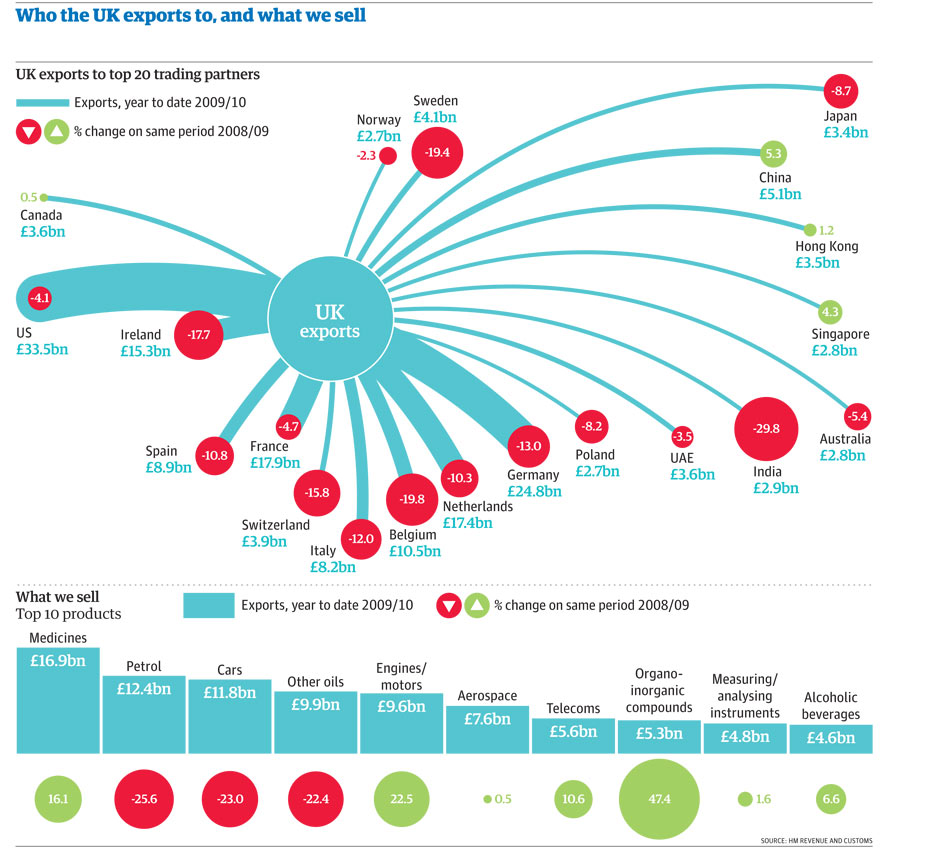
source: Guardian
By comparison, domestic household consumption is still a more important part of GDP at around 60% of GDP
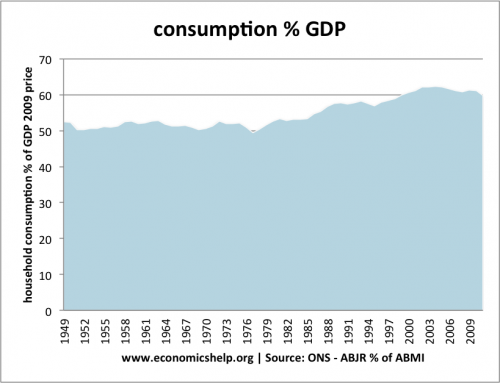
This compares to household consumption which accounts for around 60% of GDP.
US exports as % of GDP
Source: St Louis Fed
World exports as % of GDP
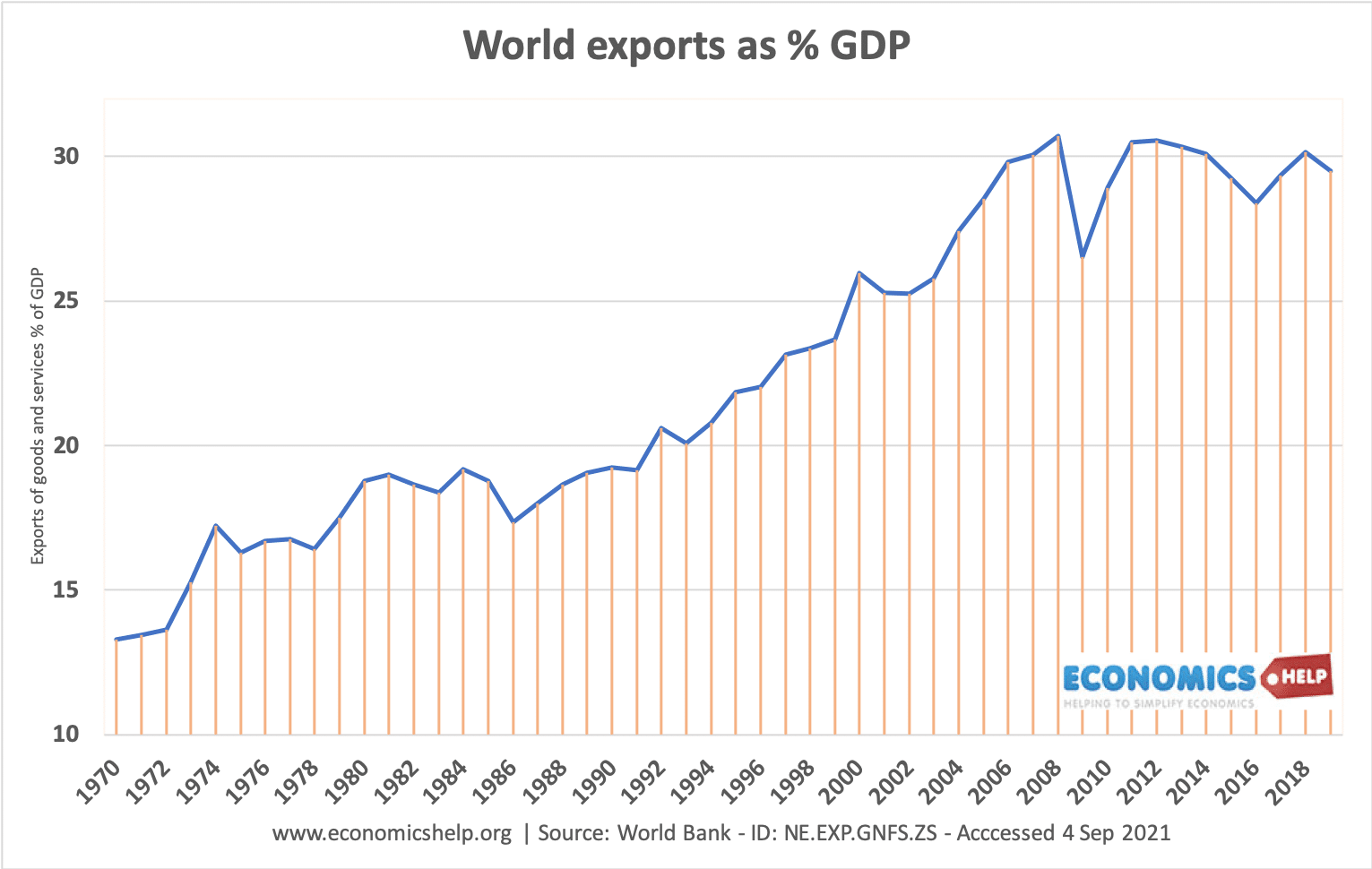
Source: World Bank
Related

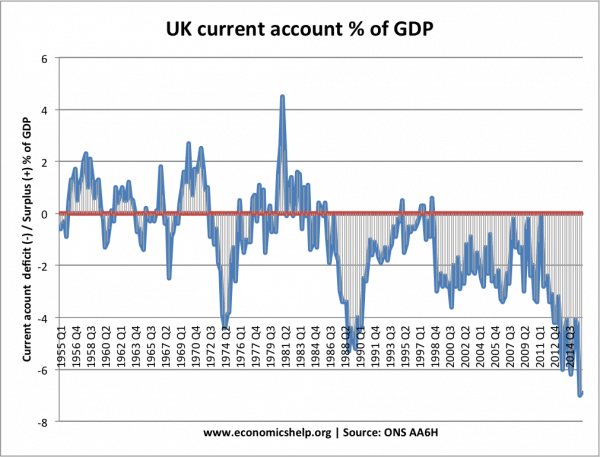
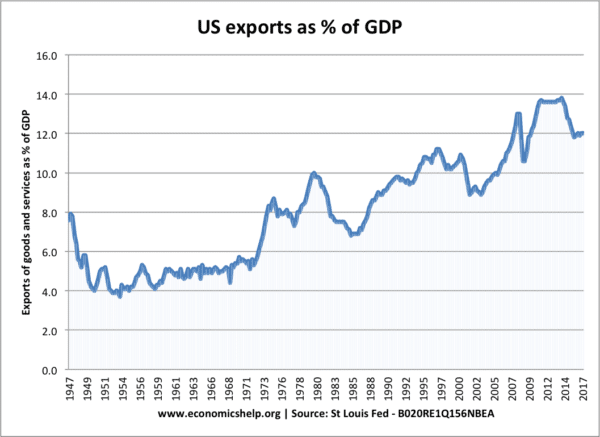
what will be the importance of exports of an individual firm it a country’s economy?
Exports is still very important in the economy together with imports. Understanding them is very helpful why our country is still exporting and importing. This is interesting! Thank you for sharing!
Export marketing is the best way to transfer service or merchandise with one to another country.
You’ve said in the article that exports to Europe account for 55-60% of GDP, but then further down that domestic consumption accounts for 60% of GDP. Can’t be right as that equates to greater than 100%; perhaps you meant that exports to Europe account for 55-60% of total exports from the UK?